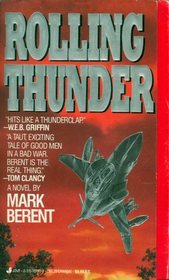From Publishers Weekly
Berent is a decorated Air Force pilot who served three tours in Vietnam. His first novel is essentially a series of vignettes and anecdotes loosely structured around the yearlong tours of duty of Air Force Captain Court Bannister and First Lieutenant Toby Parker, with a ground-force counterpoint in Special Forces Major Wolf Lochert. Principal villains are the Washington policy-makers who send men to die in a war they are not allowed to win. Within this intellectually unsophisticated black-and-white framework, however, Berent's laconic, jargon-rich narrative evokes moods eclipsed by later and more spectacular events. Set in the mid-'60s--the last stages of the professionals' war, when career soldiers were still able to believe in what they were doing--the story focuses on ground-support operations over the south of Vietnam. This was a war the Air Force had been unprepared for and was uninterested in fighting, a war of obsolescent fighter-bombers flown by men who had dreamed of becoming astronauts, and of the Forward Air Controllers, the daring FACs, who called them in on almost-invisible targets. Yet as the novel ends, its protagonists intend to return for another tour of duty, which has come to overshadow survival in their minds. Fortunate is the country, Berent tells readers, where such men wear its uniforms; may they never again be so betrayed. The message is no less powerful for being predictable.
Berent is a decorated Air Force pilot who served three tours in Vietnam. His first novel is essentially a series of vignettes and anecdotes loosely structured around the yearlong tours of duty of Air Force Captain Court Bannister and First Lieutenant Toby Parker, with a ground-force counterpoint in Special Forces Major Wolf Lochert. Principal villains are the Washington policy-makers who send men to die in a war they are not allowed to win. Within this intellectually unsophisticated black-and-white framework, however, Berent's laconic, jargon-rich narrative evokes moods eclipsed by later and more spectacular events. Set in the mid-'60s--the last stages of the professionals' war, when career soldiers were still able to believe in what they were doing--the story focuses on ground-support operations over the south of Vietnam. This was a war the Air Force had been unprepared for and was uninterested in fighting, a war of obsolescent fighter-bombers flown by men who had dreamed of becoming astronauts, and of the Forward Air Controllers, the daring FACs, who called them in on almost-invisible targets. Yet as the novel ends, its protagonists intend to return for another tour of duty, which has come to overshadow survival in their minds. Fortunate is the country, Berent tells readers, where such men wear its uniforms; may they never again be so betrayed. The message is no less powerful for being predictable.
The Pride of the Air Force. The Challenge of Vietnam. Author Mark Berent is a veteran of three tours in Vietnam, and winner of the Silver Star and two Distinguished Flying Crosses.




